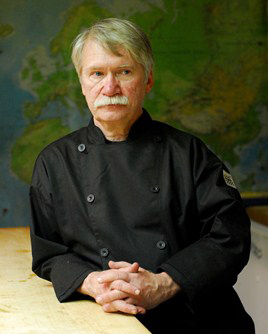Think Tank: It’s All about People
29 April 2015
 Graduates will not remember many specifics of their educations, and will even realize that so much they thought would be important to their life paths isn’t. But they will remember those who influenced their learning in meaningful ways.
Graduates will not remember many specifics of their educations, and will even realize that so much they thought would be important to their life paths isn’t. But they will remember those who influenced their learning in meaningful ways.
By Paul Sorgule, MS, AAC
Another academic year has come and gone. After students walk across the stage, every administrator, faculty member, student and parent has an opportunity to reflect on the two or four years that went into making graduation possible.
Deans and directors are beginning to plan time into their summer schedules for review of curriculum, some overdue maintenance on kitchen facilities, completing outcome assessment materials from the year coming to a close, and justifying budgets nearing the end of a fiscal year.
Faculty are putting course materials to bed and cleaning offices as they head into some well-earned time off. Students are breathing a sigh of relief combined with that uneasy feeling as they enter the workforce, and parents are still glowing with pride—knowing that their son or daughter has just completed another phase in his or her life.
At some point, all of these individuals will want to determine whether or not it was worth it, whether or not a student is adequately prepared, whether or not a graduate’s course has been set for a positive future. Did the curriculum work? Were the kitchens on campus appropriate for the training of these young culinary students? How will success be measured as each graduate moves through the next few years of his or her life?
Every piece of the puzzle will, at some point, be evaluated to determine what works and what doesn’t. Does the school need better kitchens and classrooms, more equipment, a revised curriculum, more contemporary topics of discussion, a new student center or perhaps better appointments in residence halls? All of this counts, doesn’t it?
A few years down the road when graduates reminisce about their college years, look at their current positions and reflect on future career prospects, they will, I can guarantee, realize a few things:
- That the facilities they studied in did not made a significant difference in their lives and careers
- They might not even remember all of the courses that they completed
- They might remember the good times they had in their residence hall or student center, but it will not likely have been life-changing
- They might not be able to tell you exactly what equipment they worked with
- They will probably realize that the grade they received in specific classes is more important to them than to an employer
- They will, however, remember the people who helped them along the way
- They will never forget the faculty member who went the extra distance to make sure that they built a particular skill
- They will remember that faculty member who was demanding and tough for a reason
- They will certainly remember that person who demonstrated that “a-ha moment” in a class—exposing them to a technique or flavor that was previously not part of their life experience
- They will remember that chef on externship who took them under his or her wing
- They will remember the staff person in Career Services who took the time to help with that résumé or match them with the perfect employer
- They will remember the dean or director who always walked through kitchens pointing out the great work that a student was doing and trying hard to remember everyone’s name
- They will always remember the faculty members who understood the difference between criticism and critique
- And they will never forget the classmates who stood by their side, stepping in to help a teammate struggling with a concept
So, as we reflect on “what made it work,” we should never forget that it is never brick and mortar, never solely the best equipment, and even, to some degree, not as much the curriculum as it is the people who deliver, encourage, coach, critique and support student learning that make a difference.
Congratulations on another year of changing lives.
Paul Sorgule, MS, AAC, president of Harvest America Ventures, a “mobile restaurant incubator” based in Saranac Lake, N.Y., is the former vice president of New England Culinary Institute and a former dean at Paul Smith’s College. Contact him at This email address is being protected from spambots. You need JavaScript enabled to view it., www.harvestamericaventures.com.
